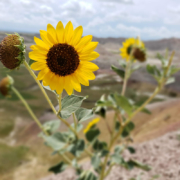A Model for Thinking About Tools
We have had many great conversations in webinars, emails, and phone calls about the importance of place-based, ethical, and Indigenous-led research. Everyone seems to agree that the priority is to support Indigenous-led research about biodiversity-health-well-being that builds capacity within Indigenous organizations to document and share their own knowledge in meaningful ways.
What kinds of tools do university colleagues and others have available to share in “toolboxes” that can be “harnessed” by Indigenous governments and organizations?
This question is important not only for understanding how we proceed in our work together but also as an approach to help us fill out one of the sections of the full proposal, the due date of which is fast approaching. I am asking if people would be willing to participate in working groups related to some conventional academic areas. Every one of our team members seems very supportive of a place-based model and supporting Indigenous and interdisciplinary work on biodiversity-health-well-being but people have different disciplinary backgrounds and interests. (For example, the wonderful Andrea Jane Reid does amazing community-based research that is very holistic and has expertise in fisheries biology. What are the best – wise practices from your area of study or work that we need to showcase in the proposal?
Can you self-identify into one of these groups (flower diagram below) to help move some of these discussions along?
Later in February, we will have other working groups on such issues as climate change, gender identities, community-based monitoring which are cross-cutting themes, methods, and outcomes but I would ask that we start here. If you do not know which group you want to join, we will assign you to a group. Once we know the groups, we will ask someone to Chair the group and take notes to send back to the PI team. It is great if you want to join more than one group. The more input you are able to provide the happier we will be and the richer the proposal will become. Please let us know which group you would like to join by using the google form (or by emailing us at info@arramatproject.org)

Toolbox Themes

 © Tracy Howlett
© Tracy Howlett
 © Adobe Stock
© Adobe Stock